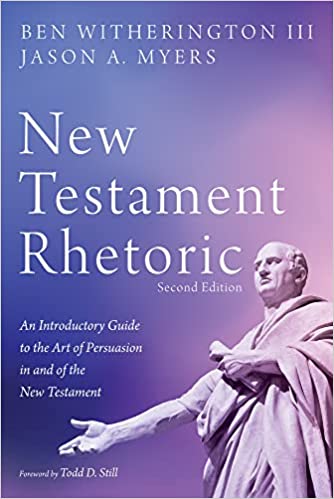 In the same Cambridge volume I mentioned in the last post, there is a discussion about Aristotle’s Art of Rhetoric. Aristotle was neither the first and certainly not the last to provide a handbook on this subject, but there is little doubt that of the early volumes his was the most influential for a variety of reasons. Aristotle is in the first place concerned with the interface between rhetoric and good logical reasoning. In the first two volumes of his Art of Rhetoric he focuses on “discovering the possible means of persuasion on every subject” (I.2)!!! Because one is seeking to prove ones point doing rhetoric properly requires one understand certain rules of logic/reasoning. It is interesting that a lot of Books 1 and 2 focus on analyzing syllogisms, in particular the rhetorical enthymeme (which can take the form of an incomplete syllogism in which the listener is expected to fill in the blank). But what kinds of arguments work with what kinds of audiences? One size does not fit all. For Aristotle, the true rhetor must be a philosopher in the sense that he must be able to employ logic and sound deductive reasoning. Also “the would be orator …needs to understand ethical concepts and…needs enough psychology to know what will move an audience’s emotions.” (p. 121). Book 2 in fact focuses on how to obtain the goodwill and interest of the audience, being able to judge the audience’s interests and emotions from the outset. The third book of Aristotle on this subject focuses on style, including prose style, the use of metaphors especially which he deems very appropriate for a rhetorical discourse since they are readily used in normal conversation. He also stresses the clarity of one’s style, the avoiding of bad grammar and ambiguity, the proper use of connective particles. He stresses that the 3 kinds of rhetoric (Judicial, Deliberative, Epideictic) require different styles. Speeches written out to be declaimed orally should be more histrionic than more records to be read, which requires more succinctness and precision. In short, writing speeches well is a key to speaking speeches well. Much would change when Latin speakers got trained in Greek orator, and then sought to apply what they learned to the delivery of speeches in good Latin. In the next post we will need to talk about factors of importance during the Roman Republic and before the Empire.
In the same Cambridge volume I mentioned in the last post, there is a discussion about Aristotle’s Art of Rhetoric. Aristotle was neither the first and certainly not the last to provide a handbook on this subject, but there is little doubt that of the early volumes his was the most influential for a variety of reasons. Aristotle is in the first place concerned with the interface between rhetoric and good logical reasoning. In the first two volumes of his Art of Rhetoric he focuses on “discovering the possible means of persuasion on every subject” (I.2)!!! Because one is seeking to prove ones point doing rhetoric properly requires one understand certain rules of logic/reasoning. It is interesting that a lot of Books 1 and 2 focus on analyzing syllogisms, in particular the rhetorical enthymeme (which can take the form of an incomplete syllogism in which the listener is expected to fill in the blank). But what kinds of arguments work with what kinds of audiences? One size does not fit all. For Aristotle, the true rhetor must be a philosopher in the sense that he must be able to employ logic and sound deductive reasoning. Also “the would be orator …needs to understand ethical concepts and…needs enough psychology to know what will move an audience’s emotions.” (p. 121). Book 2 in fact focuses on how to obtain the goodwill and interest of the audience, being able to judge the audience’s interests and emotions from the outset. The third book of Aristotle on this subject focuses on style, including prose style, the use of metaphors especially which he deems very appropriate for a rhetorical discourse since they are readily used in normal conversation. He also stresses the clarity of one’s style, the avoiding of bad grammar and ambiguity, the proper use of connective particles. He stresses that the 3 kinds of rhetoric (Judicial, Deliberative, Epideictic) require different styles. Speeches written out to be declaimed orally should be more histrionic than more records to be read, which requires more succinctness and precision. In short, writing speeches well is a key to speaking speeches well. Much would change when Latin speakers got trained in Greek orator, and then sought to apply what they learned to the delivery of speeches in good Latin. In the next post we will need to talk about factors of importance during the Roman Republic and before the Empire.












